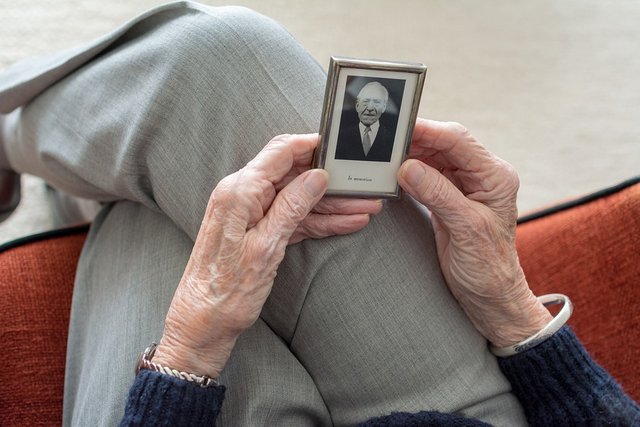How To Deal With The Death Of A Loved One
One of nature’s undiscovered secrets is the time of the death of an individual. In our hearts, we all know that death is a part of life. In fact, death gives meaning to our existence because it reminds us how precious life is.
The loss of a loved one (spouse, sibling or parent) is life’s most stressful event and can cause a major emotional crisis if adequate support is not given to the bereaved. After the death of someone you love, you experience bereavement, which means to be deprived by death.

May 1st is always ever-green in my memory, I lost my mum to the cold hands of death about 14 years ago, and she virtually died in my arms. You can imagine the trauma I was made to face as a young lad having to be the one to witness the whole process. I was emotionally shattered, but I had to be strong and swing into action, for my little sister (at that time) was very innocent and was not emotionally matured to face the scene at a young tender age. Coping with life has not been easy without my mum, but I am better each passing day. May her gentle soul rest in peace.
#Mourning is the natural process you go through to accept a major loss. Mourning may include religious, traditional honoring the dead. Or gathering with friends and families to share your loss. Mourning is personal and may last for months or years.
Grief is a great sadness, especially at the death of someone.source. Grieving is the outward expression of your loss. Everyone experiences grief at a point in life when death strikes. It is an inescapable reality of human existence.
Anticipatory grief is grief that strikes in advance of an impending loss. You may feel anticipatory grief for a loved one who is sick and dying. children and adults often feel the pain of losses brought on by an upcoming move or divorce. This anticipatory grief helps us prepare for such losses.
Grieving is a personal experience. Depending on who you are and the nature of your loss, your process of grieving will be different from another person's experience. There is no "normal and expected" period of time for grieving. Some people adjust to a new life within several weeks or months. Others take a year or more, particularly when their daily life has been radically changed or their loss was traumatic and unexpected.

CAUSES OF GRIEVING
Grief is typically triggered by a sudden loss caused by a traumatic or unanticipated event. Examples of such events include
Death of a loved one (spouse, sibling or parent).
Job loss.
Being diagnosed with a chronic or terminal disease.
Disability from a severe accident or illness.
Divorce.
Pregnancy loss .
Inability to achieve conception after marriage (infertility).
An act of violence or a natural disaster.
Starting school (loss of the comfort of home and familiar surroundings).
Marriage (loss of independent decision making).
Birth of a child (loss of independence).
Retirement (loss of income, work-related identity, and daily social contact).
Aging and maturing (loss of physical strength and youthful appearance)
Loss of an important life document.

EXPRESSION OF GRIEF (SYMPTOMS OF GRIEF)
Your experience of grief is likely to be different from another person's. Similarly, you will probably grieve somewhat differently each time you experience a significant loss. Your reaction to loss is influenced by the relationship you had with the lost person, object, or situation, and your general coping style, personality, and life experiences. How you express grief is influenced in part by the cultural, religious, and social rules of your community.
Grief is expressed physically, emotionally, socially, and spiritually
Physical expressions of grief often include crying and wailing, headaches, loss of appetite, difficulty sleeping, weakness, fatigue, feelings of heaviness, aches, pains, and other stress-related ailments.
Emotional expressions of grief include feelings of sadness, worry, anxiety, frustration, anger etc.
Social expressions of grief may include feeling detached from others, isolating yourself from social contact, and behaving in ways that are not normal for you.
Spiritual expressions of grief may include questioning the reason for your loss, the purpose of pain and suffering, the purpose of life, and the meaning of death. After a death, your grieving process is influenced by how you view death.
Grieving could be prolonged which may tilt the individual to depression, anxiety, suicidal thoughts, post-traumatic stress disorder (PTSD) may also result.

DETERMINANTS OF GRIEVE
Age and emotional development influence the way a person grieves a death
Children younger than age 7 usually perceive death as separation. They may feel abandoned and scared, and fear being alone or leaving people they love. Grieving young children may not want to sleep alone at night, or they may refuse to go to daycare or school.
Children under age 7 usually are not able to verbally express their feelings; instead, they tend to act out their feelings through behaviors, such as refusing to obey adults, having temper tantrums, or role-playing their lives in pretend play. Children younger than age 2 may refuse to talk and be generally irritable. Children between the ages of 2 and 5 may develop eating, sleeping, or toileting and bed-wetting disorders.
Children between the ages of 7 and 12 often perceive death as a threat to their personal safety. They tend to fear that they will die as well and may try to protect themselves from death. While some grieving children want to stay close to someone they think can protect them, others withdraw. Some children try to be very brave or behave extremely well; others behave terribly. A grieving child may have problems concentrating on schoolwork, following directions, and doing daily tasks. Children in this age group need the reassurance that they aren't somehow responsible for the death they are grieving.
TEENS. Perceive death much like adults do. But they may express their feelings in dramatic or unexpected ways. For example, they may join a religious group that defines death in a way that calms their feelings. They may try to defy death by participating in dangerous activities, such as reckless driving, smoking cigarettes, drinking alcohol, taking illegal drugs, or having unprotected sex. Like adults, preteens and teens are capable of suicidal thoughts when grieving. Warning signs of suicide in children and teens may include preoccupation with death or suicide or giving away belongings.

COMPONENTS OF GRIEF.
Ramsay and de Groot described nine components of grief which includes:
Disbelief and Shock: Usually the first response, most often described as a feeling of numbness. It may involve the feeling of pain and apathy, it is as if these feelings are so strong that they turned off other feelings, this can last from a few seconds to a few weeks.
Disorganization: The bereaved person may be unable to perform simple tasks; alternatively he/she may be able to organize the entire funeral and then collapses afterward.
Denial: Usually an early feature of grief, in denial stage the bereaved behaves as if the deceased were still alive believing that there has been a mistake somewhere.
Depression: Emerges as the denial breaks down, and can also occur throughout the grieving process but it tends to get less frequent and intense.
Guilt: Can be both real and imagined, for actual neglect of the deceased when they were still alive or for angry thoughts or feelings.
Anxiety: May take the form of fear of losing control of one's feelings, of going mad, or more general apprehension about the future.
Aggression: Can range from irritability towards family members and friends to outbursts of anger towards God or fate, doctors, and nurses, the clergy or even the person who had died.
Resolution: As the emotions die down, an acceptance of the death emerges, an acceptance that life must go on.
Re-integration: Acceptance is put into practice and the bereaved reorganize their life in which the dead person has no place, although they are not forgotten.

HOW TO DEAL WITH GRIEF
Grief itself is a natural response that doesn't require medical treatment. But sometimes people need help getting through the grieving process. There are different ways to go about it.
MEDICATIONS.
During the initial days of grief, anxiety or sleeplessness can make it difficult to function. If the patient suffers more than a few days of severe agitation, the physician may give a short-term sedative. (Health professionals disagree about the usefulness of drugs for people who are grieving; some health professionals believe that giving drugs for anxiety or sleep may interfere with the ability to grieve.)
Counseling.
Counselling is a talking therapy that involves a trained therapist listening to you and helping you find ways to deal with emotional issues.source
If you find that obstacles to grieving are making it difficult to function after a loss, talk to a grief counselor, attend a bereavement support group, or both. Counseling and support groups can also help you work through unresolved grief from a past loss
GOALS OF GRIEF COUNSELLING
a. To increase the reality of losses
b. Help the person deal with feelings
c. Enhance re-adjustment to life and situation

HOW TO HELP PATIENTS DEAL WITH LOSS AND BEREAVEMENT (GRIEF)
- Listen actively
- Allow patient express their feelings without fear of criticism
- Allow them to experience the sorrow, anger, anxiety or pains.
- Do not discuss what is right or wrong but solutions to the issue
- Avoid clichés
- Use appropriate language
- No false assurance
- Offer help
Coping with death is vital to your mental health. It is only natural to experience grief when a loved one dies. The best thing you can do is allow yourself to grieve. There are many ways to cope effectively with your pain.
Seek out caring people. Find relatives and friends who can understand your feelings of loss. Join support groups with others who are experiencing similar losses.
Express your feelings. Tell others how you are feeling; it will help you to work through the grieving process.
Take care of your health. Maintain regular contact with your family physician and be sure to eat well and get plenty of rest. Be aware of the danger of developing a dependence on medication or alcohol to deal with your grief.
Postpone major life changes. Try to hold off on making any major changes, such as moving, remarrying, changing jobs or having another child. You should give yourself time to adjust to your loss.
Be patient. It can take months or even years to absorb a major loss and accept your changed life.
Seek outside help when necessary. If your grief seems like it is too much to bear, seek professional assistance to help work through your grief. It’s a sign of strength, not weakness, to seek help.
Accept that life is for the living. It takes an effort to begin to live again in the present and not dwell on the past.
If I could survive the death of my loving mother as a teenager without breaking down, then I believe you could also make the best out of life.
 This is dedicated to the memory of my late mum.
This is dedicated to the memory of my late mum.
REFERENCES
Zisook S, Zisook SA (2005). Death, dying, and bereavement. In BJ Sadock, VA Sadock, eds., Kaplan and Sadock's Comprehensive Textbook of Psychiatry, 8th ed., vol. 2, pp. 2367–2393. Philadelphia: Lippincott Williams and Wilkins.
Bonanno GA, Kaltman S (2001). The varieties of grief experience. Clinical Psychology Review 21(5): 705–734.
Cordts GA, et al. (2007). Care at the end of life. In LR Barker et al., eds., Principles of Ambulatory Medicine, 7th ed., pp. 192–207. Philadelphia: Lippincott Williams and Wilkins.
Shear K, et al. (2005). Treatment of complicated grief: A randomized controlled trial. JAMA, 293(21): 2601–2608.

@antigenx 2018



You have answered a thousand questions with this post. You just earned yourself a stalking follower.
@geekis i would always appreciate your stalking lol
Well researched. The loss of a loved one can be scary and may cause depression but i believe with positive mental attitude and good people around, it gets better.
@lighyoj, a positive mental attitude ia the way to go about it like you have rightly said. thanks for stopping by.
I believe there is no easy way or universal solution to dealing with grief... but one thing is sure, if you don't grief... it doesn't go anywhere until you find courage to deal with it. Just like sleep
You have said it all ...
Tanx for stopping by
@antigenx
Your post have been upvoted and resteemed to my community.
Curator on duty @sammyswt
Thanks for sharing this wonderful piece of information.
Uwc my friend @brightfame
Beautifully written bruv! Your research was absolutely on point. I can very much relate with this;
I resented my loss of independence after i had my first daughter, It was almost a nightmare but I had to self-soothe a lot to get over it or lose my mind. I'm so sorry about your Mum's passing, May her gentle soul continue to rest in perfect peace.
Thanks for your kind words...i appreciate
Hmmm...Quite an on-point and well penned article.
Kudos brov
@abumaryam...thanks Dear
Indeed, those moments come down heavy on our emotional stability, and even affects our stimuli.
Death is part of life, that's just the reality .
Sometimes we may find it hard to believe, but truth is, today we live, tomorrow we die.
May The Soul of Your Mum Continue to rest in peace. Amen
The absolute truth.
Oh. This is so emotional. This reminds me of the period i lost my grandma from my maternal home. I was still young then, but i was so attached to her because i had lived with for some months and we were so close to each other. When she died, i felt the pain like it was my own mother. I never had an idea on how to deal with grief then, so i just had to let it go. But, it was still thoughtful bringing this issue up as it might help someone in future.
Sorry for the loss of your grandma, thanks for stopping by.
Superb sir, you wrote extensively well here.
Thank @iamchijamz